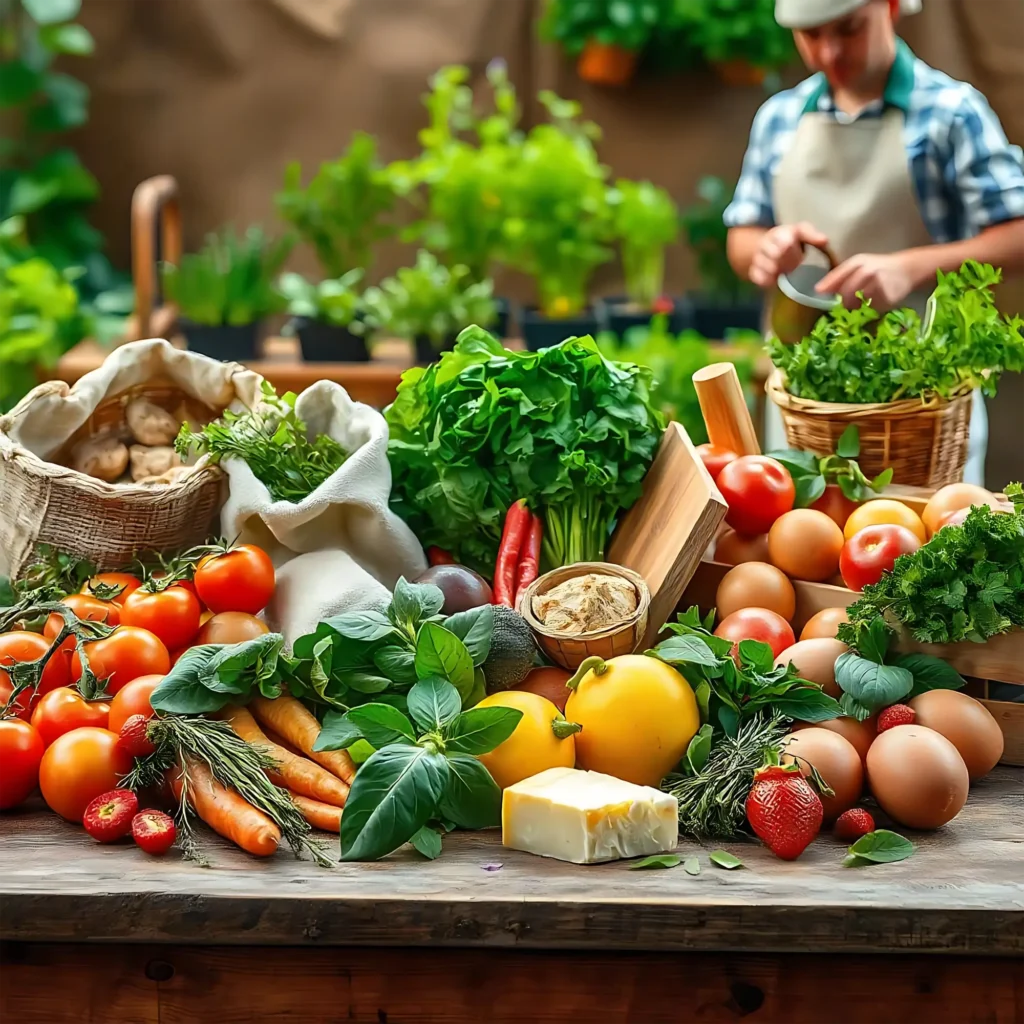The sustainability in the gastronomy it is a theme that has gained great relevance in the last years, due to its direct impact on the environment, the health and the global economy. As we move into the future, the way in which we produce, consume, and manage food will play a fundamental role in the configuration of the kitchen of the morning. In this article, we will explore how sustainability in gastronomy has become a key priority for the evolution of the culinary industry and how the organic food play a crucial role in this process.
The connection between sustainability and gastronomy
The gastronomy it not only applies to the preparation of food, but also the systems that surround its production, distribution and consumption. Sustainability in this context means to adopt practices that protect natural resources, promote social equity and promote the economic well-being. In other words, not only is cooking efficiently, but to understand how the ingredients that we use affect the planet and to the communities that produce them.
The food sector is responsible for a large part of the emissions of greenhouse gases, the excessive use of water resources and degradation of ecosystems. Therefore, the sustainability in the gastronomy it involves rethinking the entire process from farming to final consumption. This results in a shift towards practices that encourage the production and responsible consumption of food.
Why is it key to the sustainability for the future of the kitchen?
The sustainability it is essential to ensure that future generations can enjoy the same natural resources that we now take for granted. In the culinary realm, the implementation of sustainable practices not only benefits the environment, but also promotes a food culture more healthy and aware.
1. Climate change and its effects in the production of food
The gastronomy and climate change are closely related. As the global climate changes, the patterns of food production are altered, affecting both the quality and availability of certain ingredients. Climate extremes, such as droughts, floods and heat waves, are changing the way in which we grow food. For this reason, the sustainability it is crucial to mitigate these effects, using agricultural practices that respect the environment and promote the resilience of ecosystems.
2. Health and wellness
The foods we eat directly impact our health. The consumption of organic products and grown in a responsible way not only has environmental benefits, but also for our health. The organic food contain less pesticides and chemicals, which reduces the risk of diseases related to the consumption of toxic substances. Adopt a sustainable cuisine involves prioritising these fresh natural ingredients that promote a more healthy lifestyle.
3. Economic and social impact
The traditional model of food production is dominated by large corporations that prioritize profitability over the social and environmental welfare. However, by committing to sustainability in the gastronomypromotes an approach that is more inclusive and equitable. Support local farmers, the promotion of agriculture and regenerative fair trade contribute to a more just economy and balanced, which benefits both consumers and farmers and workers in the sector.
Organic food: an unstoppable trend
Within the concept of sustainability, the organic food play a central role. These products not only are grown without the use of pesticides, herbicides, or synthetic fertilizers, but they also occur following methods that promote biodiversity and reduce the carbon footprint. The growing demand for organic food reflects a change in the preferences of the consumers, who are increasingly interested in knowing the origin and impact of the food they consume.
Benefits of organic food in the kitchen sustainable
1. Greater nutritional value
Various studies have shown that the organic food they have a higher concentration of essential nutrients, such as vitamins, minerals, and antioxidants. This is due to the methods of organic agricultural allow the soil to remain healthy and balanced, which results in better quality products.
2. Reduction of the environmental impact
The production of organic food it is designed to be more friendly with the environment. These foods tend to require less water, energy and chemical products, which reduces pollution and soil degradation. In addition, the use of agricultural practices that promote crop rotation and conservation of the water helps to maintain the local ecosystem and to enhance biodiversity.
3. Promotion of the local economy
The consumption of organic food support local farmers and small businesses, creating a positive economic cycle that benefits communities. When you choose products grown in a sustainable manner, consumers help to preserve the agricultural traditions and ensure that small producers are able to continue with their practices.
Gastronomy as an engine of social change
The gastronomy it has a transformative power that goes beyond the preparation of food. The chefs and restaurants play a fundamental role in the promotion of sustainability. Through their menus, the chefs can educate diners about the importance of consuming products is responsible, and to support sustainable production.
The adoption of sustainable practices in the gastronomy it also encourages innovation. From the use of cooking techniques that minimize the waste of food, to creating dishes that highlight seasonal ingredients and local, the kitchen can be a powerful tool to drive change. In addition, many chefs are embracing the philosophy of “zero waste, using every part of the ingredient and transforming leftovers into new dishes.
The future of sustainable cuisine: innovations and challenges
The future of the gastronomy sustainable is full of opportunities and innovations. Emerging technologies, such as vertical farming and biotechnology, are opening new doors for the food production more efficient and sustainable. However, there are still important challenges, such as the need to educate consumers about the importance of choosing foods that are responsible, and the promotion of public policies that support the transition toward a more sustainable model.
It is essential that the key players of the industry, from producers to consumers, to work together to ensure a future in which the gastronomy and sustainability can co-exist harmoniously. Only that way can we ensure that future generations will enjoy a rich cuisine, healthy, and respectful of the planet.
Conclusion: A sustainable future for the gastronomy
The sustainability in the gastronomy it is not a passing trend, but an urgent need to ensure a viable future for both the planet and for the people. Adopt responsible practices and consume organic food it is a fundamental step towards the creation of a more just food system, healthy, and respectful with the environment. As the gastronomy it evolves, we must be aware that the future of the kitchen depends on our ability to integrate sustainability into every aspect of the production, distribution and consumption of food.


